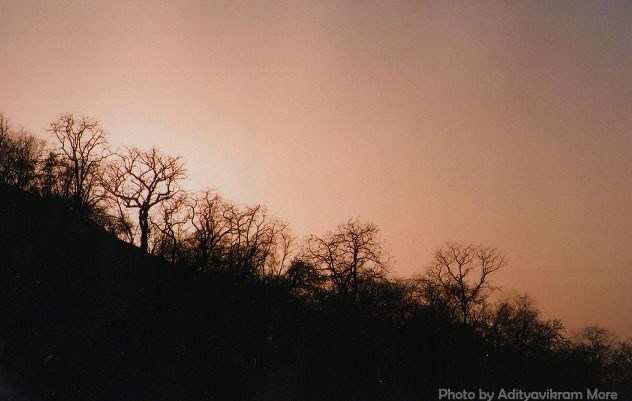Fading Guardians of Fading Jungles
Every year, when the sun is at its blazing glory, and one and all in the plains crave for the snowy mountains, we pack our rucksacks and drive down to a place where the sun is without mercy. It is Sumer, a patch of jungle in the Kumbhalgarh wildlife sanctuary, at the foot of Aravali hills
 Sumer… a name that is attached to us like the first roots of a seed that have just tasted earth, like a childhood dream you remember even when reality fades. It is a distant home we want to return to each year of our remaining lives.
Sumer… a name that is attached to us like the first roots of a seed that have just tasted earth, like a childhood dream you remember even when reality fades. It is a distant home we want to return to each year of our remaining lives.
Every year, when the sun is at its blazing glory, and one and all in the plains crave for the snowy mountains, we pack our rucksacks and drive down to a place where the sun is without mercy. It is Sumer, a patch of jungle in the Kumbhalgarh wildlife sanctuary, at the foot of Aravali hills.
A forest guest house stands at the fringe of Sumer’s dry deciduous forest, unassuming yet inviting. For fifteen years we’ve visited this jungle and the guest house and for thirty years the other guest houses of the Kumbhalgarh sanctuary.
In peak summers the forest streams and ponds are reduced to a few muddy puddles here and there. At this time, animals and birds come to quench their thirst to a water hole maintained and filled by the forest staff near the Sumer guest house.
Panther, sloth bear, hyena, blue bull, sambar, chinkara, fox, jackal, wild boar, mongoose, ratel and all other denizens of the forest come to the water hole.
We’ve seen carnivores drink water side by side with their prey; everyone under a mutual pact of peace for water. They come down from the hills to this valley each night and travel great distances to get a mouthful of water.
This is one place they can be sure of getting water, one place that would not fail them even when all the streams of the forest have run dry.
But for the past few years, the dependence on this water hole has reduced. The animals can no longer rely on this source of water. Even when it is filled, they pass by not knowing that they would find water there.
Their only reliable source of water does not exist anymore. That is because the forest rest house is no longer equipped with enough man power that can take care of its needs.
This is not just the case with Sumer jungle. All the wildlife sanctuaries of Udaipur district – Kumbhalgarh, Phulwari Ki Naal, Sajjangarh, Tatgarh Rawli and Jaisamand – are facing this problem of staff shortage. The forest department has always been quite under-staffed, and now the situation is deteriorating further.
In 1991, there were 80 employees at Kumbhalgarh wildlife sanctuary, which was not enough then, and today there are only 53. What would be the situation 20 years from now of the Udaipur forests is something we rather not ponder upon.
Even the meagre staff that there is, has hardly any facilities or funds to protect the forests. They have no equipment like walky-talkies, suitable dresses and shoes or any weapons.
Leave aside weapons; they don’t even have a wooden cane to resist the occasional fellers, poachers or trespassers. The allocated funds don’t even suffice to maintain the place.
The forest Rangers, who’re supposed to look after an entire forest range, are without proper vehicles. They should have jeeps to go inside the forest terrains and manage their range. Even where there is a rare jeep or two, there are no drivers.
Cadre management is not good to say the least. Promotions of some of the forest staff has been stalled not for years but for decades. At least once in ten years, when it is time for staff promotion, a post should be created and the staff should be promoted likewise.
But there have been hardly any senior posts created. Some of the employees have remained on the same post for more than 20-22 years, many of whom are now fast approaching retirement.
There had been a ban on recruitments since 1986. For 25 years, there was no new field staff taken in. The older staff gradually retired. The ban was finally lifted this year, but still two-third vacancies remain unfilled. However, new IFS pass-outs are taken in every year as forest officers.
Every organisation has a pyramid structure – most number of employees at the bottom, less in the middle tiers and least on the top. In the forest department the pyramid has been reversed – put upside down. There are more officers today than field staff.
What motivation can such an organisation inspire in its overburdened employees to go in the sweltering heat and protect the forests? To top this, now they’ve additional work of NREGA. It leaves them with precious little time to go in the field.
But in spite of the un-conducive situation and all the odds, there are people in the forest department who are out-and-out dedicated and truly in love with the jungles.
One such unsung hero is Ganga Singh, the late forest guard of the Sumer forest. This fiercely honest man lived there, fought with the local felling goons as well as the villagers risking his own life.
He didn’t let anyone take his or her cattle for grazing inside the sanctuary limits, or as much as break a neem twig from the jungle for brushing teeth. The jungle flourished under the shield of Ganga Singh, who had nothing else for his own protection but a stick that he carried.
He was murdered on 17th Jan 1994 in the same forest by some vindictive locals. The forest had grown so thick and dense under his fatherly protection that it took three days to locate his body.
We hear about the wildlife department of the country now and then when there are sensational issues and emotions flying high. The environment ministry and society at large gets geared to action. Ground issues, which are more detrimental, remain unheard and ignored for decades.
Of course we need to preserve tigers, but our concern should also percolate down to other animals, many of whom are steadily rising in the IUCN red data book like sloth bear and wolf.
These wildlife sanctuaries, which are ideal habitat and quite needed to save such animals, stand completely neglected. They do not draw any society or government attention. We do hope that the correct measures are taken, and taken soon, to address these problems.
The forest staff, who are no less than soldiers, are protecting a different front, which is enormously important for us. The difference is that they’re protecting this front, these forests, not against a foreign enemy, but from ourselves.
Twenty years from now, we may or may not be there. But we do hope that these remaining forests stand untouched with the lonely guest houses and forest chowkis well-manned and proud.
In order to protect these temples of Nature for wilderness loving pilgrims like us, the humanity and the generations to come, we must be considerate and grateful to the sentries who live and die in shadows to protect them.
By: Raza Tehsin & Arefa Tehsin
This article was first published on www.arefatehsin.com
To join us on Facebook Click Here and Subscribe to UdaipurTimes Broadcast channels on GoogleNews | Telegram | Signal





